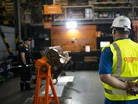Flexible energy models alleviate manufacturing struggles

As one of the UK’s leading economic sectors, the manufacturing industry creates an annual output of £183bn, providing 2.5m jobs and 64% of all domestic business research and development, according to Make UK. With 49% of manufacturers ready to increase investment into green technologies this year, demand continues to recover from the COVID-19 pandemic.
As one of Europe’s more gas-dependent nations, however, the UK sector is at risk from consistently rising energy prices and the success of operations are being threatened by the growing occurrence of power outages. As a result, manufacturers are in the market for a sustainable flexible energy model to alleviate industry-wide struggles.
Understanding the challenges in modern manufacturing
Volatile energy prices and increasing fuel prices are undoubtedly contributing to the increasing figure of manufacturing operations being affected by power outages. Detailed within Aggreko’s recent report The Power Struggle – Manufacturing, it was found that 65% of the 251 manufacturers interviewed have experienced power cuts in the last 18 months, with 30% of those being forced to temporarily halt operations and 33% reducing output simply to cope. Considering that the majority of manufacturers are now paying up to 30% more for their energy than in 2019, it is unsurprising that two thirds have seen their profit margins damaged as a result.
Despite a recent Government-issued relief package, aimed to ease pressure on the sector, Aggreko’s report highlights that many UK manufacturers are still being forced to cut staff training, sustainability drivers and other CSR initiatives to compensate for the rising cost of energy. However, manufacturers are looking at ways to navigate the crisis, with over 60% or respondents now considering generating their own electricity to offset power outages using distributed energy solutions.
It should be noted that this approach allows manufacturers greater control over their power generation, facilitating higher efficiency and in turn, reduced carbon emissions. Decentralised energy generation also provides scope for the incorporation of battery technology for decreased runtime on gensets. Moreover, UK manufacturers now face a legal obligation to decarbonise their operations in line with stricter climate targets. In this sense, the energy crisis can be viewed as the catalyst in driving manufacturers’ efforts towards net zero by ensuring greater energy efficiency among operations and incorporating cleaner, greener technology.
Matt Watson, Sales Sector Manager for Manufacturing at Aggreko
Distributed energy solutions can support the manufacturing sector
Today’s situation illustrates the necessity of manufacturers having access to potential solutions, one being Energy as a Service (EaaS), whereby they are provided with the ability to utilise decentralised energy solutions through a subscription model.
Providing operators with on-site power generation without upfront capital expenditure protects against consistently rising costs, with 57% of participants stating they had or would use EaaS, primarily through a 1- or 2-year fixed energy price agreement. Due to its historic accessibility, gas generation remains a popular technical solution to manufacturers, yet rising costs are likely to promote battery storage as the most affordable solution, in addition to solar becoming the most useful.
What might seem beneficial now, however, could prove disadvantageous throughout such a period, with uncertainty encouraging organisations to enter long-term fixed pricing arrangements regardless of whether the market settles in years to come. As a result, businesses are obliged to pay extortionate fees despite potential fluctuations in demand for energy required, therefore creating a long-term detrimental effect on their profit margins. Furthermore, customers with excessively high demands risk facing penalties, additionally increasing expenditure.
Flexible technology for hire
Manufacturers are calling out for a solution that not only lowers energy costs, reduces reliance on the grid and produces lower emissions, yet also provides crucial flexibility within their arrangements. Given that more businesses are now hiring equipment to avoid capital expenditure restrictions than three years prior, Aggreko believes that manufacturers deserve the same opportunity of Hired Energy as a Service (HEaaS).
HEaaS provides manufacturers with access to newer and more efficient technology without the threat of being tied into high fixed energy costs. If a demand changes, the threat of penalties is eliminated by the fact that users can simply add or takeaway output when necessary. It is evident that businesses must upgrade their technology within today’s market, and 75% of respondents within Aggreko’s The Power Struggle – Manufacturing report believe that rising electricity prices are impacting competitiveness in 2022, rising almost 20% since 2019. HEaaS encourages such an opportunity while acting as a low-risk option for greener solutions that keep pace with energy transition and the industry’s determination in achieving net-zero targets.
Closing thoughts on the manufacturing industry and its sustainability goals
It is impossible to forecast stability in the coming years for the UK manufacturing industry, as energy prices continue to soar, and production remains to be disrupted by consequent power outages. It is vital that not only should manufacturers have contingency equipment in place to deal with such occasions, but they must also discuss the solutions that guarantee a long-term fix to achieving organisational sustainability goals.
HEaaS services offered by Aggreko are likely to be of benefit, with such models allowing businesses to reduce their capital expenditure by receiving the necessary energy to power operations, without the risk of facing penalties or being locked into unaffordable fixed pricing contracts seen within standard EaaS contracts. As competitiveness continues to increase throughout the UK manufacturing industry, distinguishable features like HEaaS could prove indispensable in ensuring both long-term security and success.
Read Aggreko’s full report, The Power Struggle – Manufacturing, here.

